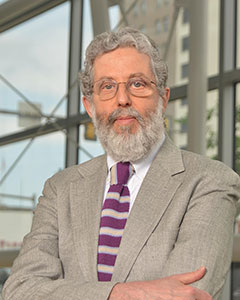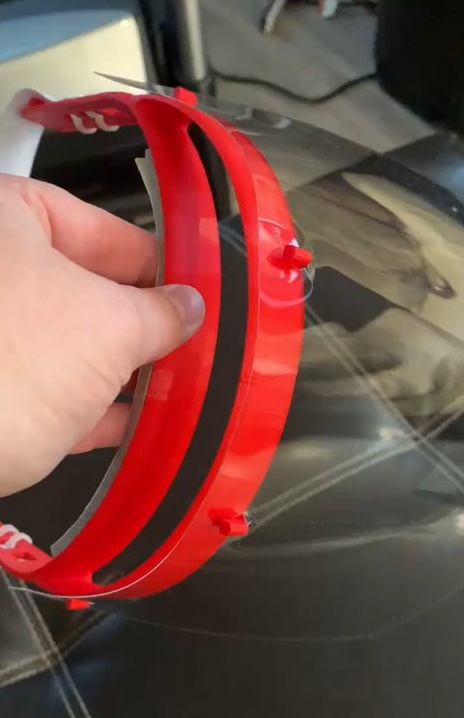Several of our faculty members are adapting their research and coursework to respond to the urgent and rapidly evolving nature of the COVID-19 outbreak. Here are a few of the up-and-coming projects that have come out of the coronavirus response.
Coronavirus & Engineering Course

Dr. Charles Haas
“Coronavirus & Engineering” (ENVE T480), a new spring term course by Dr. Charles Haas, department head in the Department of Civil, Architectural and Environmental Engineering and LD Betz Professor of Environmental Engineering, has been created in response to the current outbreak of SARS-COV-2 (aka COVID-19). Dr. Haas plans to engage engineers and quantitative scientists in what they can “bring to the table” to understand, predict, and mitigate this and other outbreaks. He plans to use the rapidly evolving situation as a living case study for the course, engaging students in the social media response as well.
Drexel Answers Call for Face Shields

Dr. Michele Marcolongo, department head and professor of the Department of Materials Science and Engineering, was approached by Dr. Betsy Dantner, chair of the Emergency Department at Einstein Hospital, to make face shields to protect hospital workers during patient intubation. The hospital has a critical shortage of face shields and was looking to engineers for a quick and effective solution. Dr. Marcolongo partnered with Dr. Amy Throckmorton, associate professor in the School of Biomedical Engineering, Science and Health Systems, to create a 3D printed headband with a clear shield and foam padding. The team received a generous donation from Lowe’s for the project and is looking to scale up its efforts by partnering with manufacturers. Local news outlets 6ABC and CBS3 have covered the partnership.
Innovation Program Award

Manufacturing process
Dr. Antonios Kontsos, associate professor in the Department of Mechanical Engineering and Mechanics, was awarded a Manufacturing PA Innovation Program award, “A Digital Thread Design Approach for Product Smart Manufacturing” along with industry partner Oat Foundry, a company founded by Drexel mechanical engineering alumni. This award has been re-directed during the COVID-19 crisis and is now being applied to the design of products and devices to support health professionals and patients throughout this pandemic. “I am excited to have my research group’s capabilities in the area of digital design, computational simulations and advanced manufacturing combined with Oat Foundry’s known industrial design and manufacturing capabilities to serve our community during this global crisis,” says Kontsos. “I believe the role of engineers is to assist society to overcome its greatest challenges and this is exactly what this project will be about.”
Innovation and Collaboration Meets Needs for Reusable Masks

Textile fabric engineer Chelsea Amanatides, MSE PhD ’19, making masks at the Center for Functional Fabrics.
The Center for Functional Fabrics, under the direction of Professor Geneviève Dion, professor in the Westphal College of Media Arts & Design, is working on a COVID-19 emergency response producing new types of washable/reusable masks and respirators to be distributed through Drexel University College of Medicine. They are collaborating with Dr. Richard Hamilton, Chair of Emergency Medicine, on the design, fit, safety and form factor. As these are being produced, research continues to identify washable/reusable filters in collaboration with Dr. Michael Waring, associate professor in the Department of Civil, Architectural and Environmental Engineering on filtration testing, and Dr. Caroline Schauer, professor in the Department of Materials Science and Engineering and associate dean, research and faculty affairs in the College of Engineering, on potential filter materials, as well as Dr. Yury Gogotsi, Distinguished University and Charles T. and Ruth M. Bach Professor in the Department of Materials Science and Engineering, on anti-viral solutions for the masks.
Park Usage During Mandated Social Distancing

Dr. Franco Montalto
Dr. Franco Montalto, Professor in the Department of Civil, Architectural and Environmental Engineering has received a National Science Foundation (NSF) RAPID grant, “Park Usage During Mandated Social Distancing.” The purpose of this project is to investigate how people are using urban parks in this era of social distancing. On the one hand, urban parks promote resilience by promoting social contact, recreation, leisure, and other psychosocial processes that build trust, generate place attachment, social support, and feelings of belonging and empowerment. On the other hand, visits to parks could potentially accelerate the spread of this highly contagious disease by creating more person-to-person contact and/or transmission of the virus to playground surfaces, benches, handrails, bike racks, or other surfaces. Working with civic scientists enabled by digital technology, Dr. Montalto and his team will observe and report park user behavior in New York City and Philadelphia. By paying the civic scientists to participate in the research, his team will demonstrate a replicable approach to building economic resilience during the pandemic.
NSF Grant Explores Plasma Abatement of Virus

Dr. Alexander Fridman
Dr. Alexander Fridman, John A. Nyheim Chair Professor in the Department of Mechanical Engineering and Mechanics and Director of the C. & J. Nyheim Plasma Institute, has received a National Science Foundation (NSF) Industry-University Cooperative Research Program (IUCRC) RAPID grant. Drexel University, along with the University of Michigan and George Washington University, will pursue a project on the fast adaptive plasma abatement of corona virus. Adaptive plasma means, in this case, the coordination of the detection of microorganisms with their deactivation. In addition to Dr. Fridman, Nyheim Plasma Institute research faculty Professors Alexander Rabinovich and Danil Dobrynin will also be involved, as well as Dr. Christopher Sales, associate professor in the Department of Civil, Architectural and Environmental Engineering, who will provide expertise in microbiology and virology. The Drexel Plasma team will focus on airborne microorganisms based on their experience with plasma suppression of airborne anthrax in large volumes, as well as an ongoing large-scale Defense Logistics Agency project on plasma mist treatment and deactivation for produce safety.